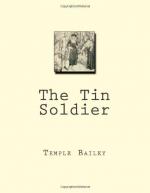“Of course. That’s why I fell in love with you—because you had red blood in your veins.”
It was the literal truth. The first time that Ralph had seen Jean McKenzie, he had been riding in Rock Creek Park. She, too, was on horseback. It was in April. War had just been declared, and there was great excitement. Jean, taking the bridle path over the hills, had come upon a band of workers. A long-haired and seditious orator was talking to them. Jean had stopped her horse to listen, and before she knew it she was answering the arguments of the speaker. Rising a little in her stirrups, her riding-crop uplifted to emphasize her burning words, her cheeks on fire, her eyes shining, her hair blowing under her three-cornered hat, she had clearly and crisply challenged the patriotism of the speaker, and she had presented to Ralph’s appreciative eyes a picture which he was never to forget.
She had not been in the least embarrassed by his arrival, and his uniform had made him seem at once her ally. “I am sure this gentleman will be glad to talk to you,” she had said to her little audience. “I’ll leave the field to him,” and with a nod and a smile she had ridden off, the applause of the men following her.
Ralph, having put the long-haired one to rout, had asked the men if they knew the young lady who had talked to them. They had, it seemed, seen her riding with Dr. McKenzie. They thought she was his daughter. It had been easy enough after that to find Jean on his mother’s visiting list. Mrs. Witherspoon and Mrs. McKenzie had exchanged calls during the life-time of the latter, but they had lived in different circles. Mrs. Witherspoon had aspired to smartness and to the friendship of the new people who brought an air of sophistication to the staid and sedate old capital. Mrs. McKenzie had held to old associations and to old ideals.
Mrs. Witherspoon was a widow and charming. Dr. McKenzie was a widower and an addition to any dinner table. In a few weeks the old acquaintance had been renewed. Ralph had wooed Jean ardently during the short furloughs which had been granted him, and from long distance had written a bit cocksurely. He had sent flowers, candy, books and then, quite daringly; a silver trench ring.
Jean had sent the ring back. “It was dear of you to give it to me, but I can’t keep it.”
“Why not?” he had asked when he next saw her.
“Because—”
“Because is no reason.”
She had blushed, but stood firm. She was very shy—totally unawakened—a little dreaming girl—with all of real life ahead of her—with her innocence a white flower, her patriotism a red one. If only he might wear that white and red above his heart.
As a matter of fact, Jean resented, sub-consciously, his air of possession, the certainty with which he seemed to see the end of his wooing.
“You can’t escape me,” he had told her.




